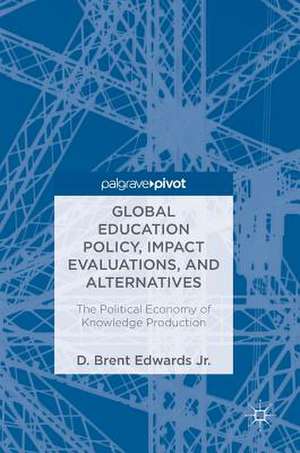Global Education Policy, Impact Evaluations, and Alternatives: The Political Economy of Knowledge Production
Autor D. Brent Edwards Jr.en Limba Engleză Hardback – 19 apr 2018
| Toate formatele și edițiile | Preț | Express |
|---|---|---|
| Paperback (1) | 379.48 lei 43-57 zile | |
| Springer International Publishing – 26 dec 2018 | 379.48 lei 43-57 zile | |
| Hardback (1) | 330.92 lei 38-44 zile | |
| Springer International Publishing – 19 apr 2018 | 330.92 lei 38-44 zile |
Preț: 330.92 lei
Nou
Puncte Express: 496
Preț estimativ în valută:
63.32€ • 66.28$ • 52.70£
63.32€ • 66.28$ • 52.70£
Carte tipărită la comandă
Livrare economică 26 martie-01 aprilie
Preluare comenzi: 021 569.72.76
Specificații
ISBN-13: 9783319751412
ISBN-10: 3319751417
Pagini: 175
Ilustrații: XIII, 157 p. 1 illus.
Dimensiuni: 148 x 210 x 18 mm
Greutate: 0.36 kg
Ediția:1st ed. 2018
Editura: Springer International Publishing
Colecția Palgrave Macmillan
Locul publicării:Cham, Switzerland
ISBN-10: 3319751417
Pagini: 175
Ilustrații: XIII, 157 p. 1 illus.
Dimensiuni: 148 x 210 x 18 mm
Greutate: 0.36 kg
Ediția:1st ed. 2018
Editura: Springer International Publishing
Colecția Palgrave Macmillan
Locul publicării:Cham, Switzerland
Cuprins
1. Introduction.- 2. Knowledge production, the World Bank, and Global Education Reform.- 3. Critically Reviewing Impact Evaluations within the Political Economy of Global Education Reform.- 4. Methods.- 5. The Reform Context of El Salvador: Structural Transformation During a Civil War.- 6. EDUCO’s Emergence.- 7. Impact Evaluations of EDUCO: A Critical Review.- 8. What Can We Say About EDUCO?.- 9. Implications: National and International.- 10. Conclusions: Persistent Limitations and Alternative Approaches.
Notă biografică
D. Brent Edwards Jr. is Assistant Professor of Theory and Methodology in the Study of Education at the University of Hawaiʻi, Mānoa, USA. His research focuses on the political economy of education reform and global education policies. He was previously a Visiting Scholar at the University of Amsterdam, The Netherlands, a Fulbright Scholar at the University of Central America, El Salvador, and a Post-Doctoral Researcher at The University of Tokyo, Japan.
Textul de pe ultima copertă
This book contributes to how we conceptualize and investigate the role and influence of knowledge production by international organizations within the field of global education reform. After elaborating on what it means to approach the intersection of these issues from a political economy perspective, the book develops a focus on knowledge production broadly to examine specifically the production of impact evaluations, which have come to be seen by many as the most credible form of policy-relevant knowledge. Moreover, it not only unpacks the methodological, technical, political, and organizational challenges in the production of impact evaluations, but also details an approach to critically understanding and examining the role that impact evaluations, once produced, play within the political economy of global education reform more generally. Finally, this book demonstrates the application of this approach in relation to a global education policy from El Salvador and reflects on the implications of this case for alternative ways forward, methodologically and otherwise.
D. Brent Edwards Jr. is Assistant Professor of Theory and Methodology in the Study of Education at the University of Hawaiʻi, Mānoa, USA. His research focuses on the political economy of education reform and global education policies. He was previously a Visiting Scholar at the University of Amsterdam, The Netherlands, a Fulbright Scholar at the University of Central America, El Salvador, and a Post-Doctoral Researcher at The University of Tokyo, Japan.
Caracteristici
Reveals hidden history of an education policy that went global, with emphasis on the role of impact evaluations Proposes and then applies a novel way to approach the analysis of impact evaluations, i.e., within the political economy of knowledge production Reconsiders the effects and the legacy of the “Education with Community Participation” Program in El Salvador Identifies and discusses alternatives to impact evaluations for generating policy relevant knowledge
